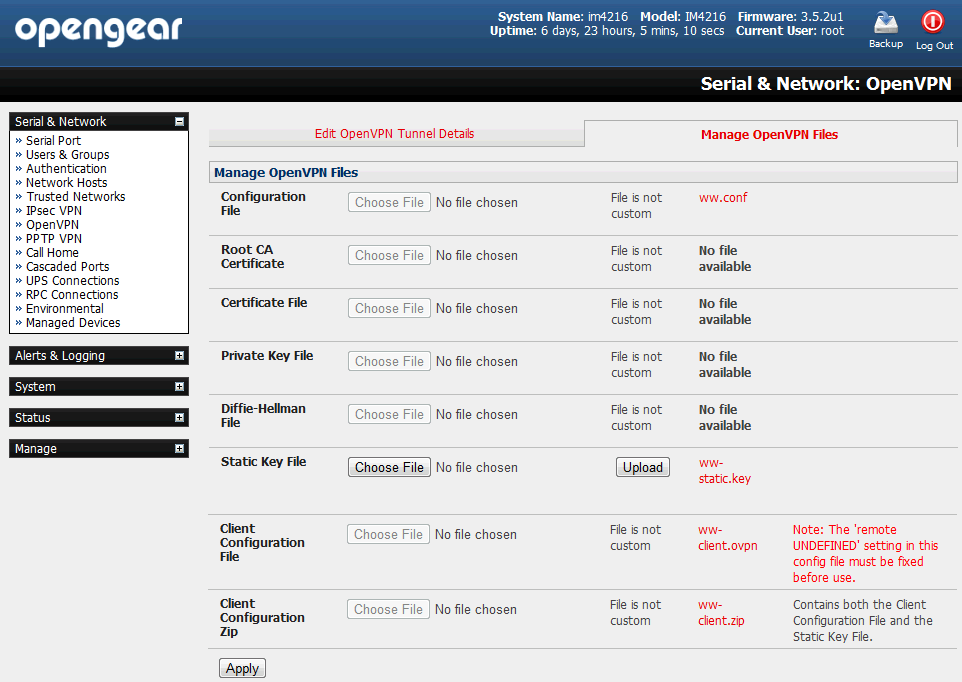Auto Generate Server Key Openvpn
Posted : admin On 17.12.2020VPN or Virtual Private Network is a group of computers connected to the private network over the public network (Internet). These days security is the primary concern for everyone and it’s more required while working over the public network.
Like you have a group of computers in a remote location. Now you need to access those computers as a LAN network in your system. Also, you need all data should be encrypted during transfer between computers. The solution is a VPN. You can use a VPN network to connect two remote location systems with each other as they are on the same LAN. This tutorial will help you to install and configure the OpenVPN server on Ubuntu, Debian, and Linux Mint systems.
Step 1 – Prerequisites
Easy Windows Guide. This page contains a no-frills guide to getting OpenVPN up and running on a Windows server and client(s). For a more detailed understanding of setting up OpenVPN and its advanced features, see the HOWTO page. I have a lot of keys to generate for my clients VPN server. Whenever I use easy-rsa to generate the keys like this./build-key client1 There is some output with a series of questions. The questions all have default answers that are defined in the vars file.
Login to your Ubuntu system using SSH. Now update system’s apt cache and update your system packages to latest versions.
Configuring an OpenVPN Server in DD-WRT — 3. I was contacted about my previous attempts to configure OpenVPN in DD-WRT.I never completed the project. The contact person offered a possible solution and asked me to test. Auto-generated random URL. The command will generate key, crt and csr file. /https-wp2pgpmail-com-pgp-key-generator.html. The OpenVPN server listens on a management socket.
- This HOWTO article is a step-by-step guide that explains how to create the server and client OpenVPN configuration files that makes this possible. In the process this article explains how to create the public key infrastructure (PKI) so that a client can securely communicate with the server.
- Sep 07, 2018 Alternatively, you could generate an SSH keypair for each server, then add the OpenVPN server’s public SSH key to the CA machine’s authorizedkeys file and vice versa. See How to Set Up SSH Keys on Debian 9 for instructions on how to perform either of these solutions.
Step 2 – Install OpenVPN Server
Now, Install the OpenVPN package by typing below command. Also, install
Copy the sample configuration file for OpenVPN to /etc/openvpn/server.conf file. This will be used as an OpenVPN server configuration file.
Step 3 – Configure OpenVPN Server
Auto Generate Server Key Openvpn Server
Enhanced and secured rsa key generation scheme esrkgs. Edit the OpenVPN server configuration file in your favorite text editor.
Remove the “;” to uncomment lines or add new lines for the following entries in the configuration file.
The above settings will allow VPN connection between systems. But they will not direct the client’s internet traffic through VPN. Also, uncomment the dhcp-option values.
Step 4 – Update Network Configuration
Do some network settings to allow users to access the server on the same network of OpenVPN servers. First, Allow IP forwarding on the server by executing the below commands to set
Masquerade the internet traffic coming from the VPN network (10.8.0.0/24) to systems local network interface (eth0). Where 10.8.0.0 is my VPN network and eth0 is the network interface of my system.

Step 5 – Setup Certificate Authority
OpenVPN provides secure VPN service using TLS/SSL encryption of traffic between server and client. For this, you need to issue trusted certificates for servers and clients to work. To issue certificates you need to configure Certificate Authority on your system.
Let’s create a directory for certificate authority using
Edit
and update the below values as required. These values will be used as default values to issues the certificates for servers and clients. You can also overwrite these values during certificate creation.
Load the values in system environment.
Now use
Sample output of above command:
Now your system is ready as Certificate Authority to issue the certificates.
Step 6 – Generate Server Certificate Files
Firstly create the certificates for the OpenVPN server using the
Sample output of above command:
Now generate a strong Diffie-Hellman key to use for the key exchange using the command. This command may take some time to complete.

After that generate an HMAC signature to make more secure TLS integrity verification capabilities of the server.
After creating all files, copy them to
Step 7 – Start OpenVPN Service
OpenVPN server is ready now. Let’s start the service using the systemctl command. Also, Check the status of service.
On the successful start of service, you will see results like below.
OpenVPN will create a network interface name
Step 8 – Generate Client Configuration
You OpenVPN server is ready to use. Now generate the client configuration files including the private key, certificates. I have made this process easier for you to generate any number of configurations files using a simple script. Follow the below steps to generate configuration files. Make sure to use correct directory structure.
Create a shell script file as below.
copy the below content. Update the
2 4 6 8 10 12 14 16 18 20 22 24 26 28 30 32 34 36 38 40 | OPENVPN_SERVER='192.168.1.237' CLIENT_DIR=/etc/openvpn/clients cd${CA_DIR} ./build-key${CLIENT_NAME} echo'client protoudp user nobody persist-key cipher AES-128-CBC key-direction1 comp-lzo ${CA_DIR}/keys/ca.crt ${CA_DIR}/keys/${CLIENT_NAME}.crt ${CA_DIR}/keys/${CLIENT_NAME}.key ${CA_DIR}/keys/ta.key >>${CLIENT_DIR}/${CLIENT_NAME}.ovpn echo-e'Client File Created - ${CLIENT_DIR}/${CLIENT_NAME}.ovpn' |
Set the execute permission on the newly created script.
Now use this script to generate configuration file for the VPN clients including certificates and keys. You need to pass client name as command line parameter.
Press enter for the default values of the certificate. At the end, it will prompt for the sign the certificate and commit. Press y for both inputs.
The above script will create client configuration file under /etc/openvpn/clients/ directory with client name with .ovpn extension as shows in last line of output. Use this file to connect from remote systems.
Step 9 – Connect VPN from Clients
You need the configuration file generated from above
Windows Clients
Download OpenVPN GUI client software from its official download page and install on your system. Now copy the given .ovpn file under
Linux Clients
On Linux clients, First, you need to install OpenVPN packages. After that use the following command to connect to the OpenVPN server using the given client configuration file.
After successfull connection OpenVPN will assign an IP address to your system. Use following command to check assigned IP address.
[output]
Hello,I installed OpenVPN on a Ubuntu machine, and generated certificates to allow another Linux client to connect. Verified it's working, and the client is forced to use the VPN tunnel.
Generate Openvpn Keys
In the example I followed, the server certs (including the DH pem file) were moved to /etc/openvpn. Client certs were moved elsewhere.Now that it's working I'd like to generate certificates to allow me to add additional clients. I tried this by going to /etc/openvpn/easy-rsa and running 'build-key clientname'. I received a message about needing to source vars and .clean-all first. So I ran these commands (knowing that the certificates in the keys folder had already been moved out). Then I tried to generate the client certs again. This time I received a message about missing the CA certs and the private key. I then moved ca.* & dh1024.pem back over to the keys folder and tried again. Now I get a message 'Unable to load CA Private Key 140431349081752:error:0906D06C:PEM routines:PEM_read_bio:no start line:pem_lib.c:701:Expecting: ANY PRIVATE KEY
Keys are still generating, but I'm guessing they're not valid. In order to generate additional client keys, do I need to re-generate server cert, CAs, and DH Keys? Or am I missing something else?
Thank you!
-bk